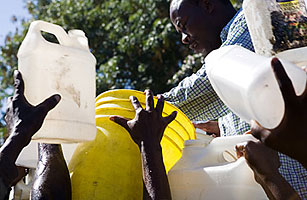
Port-au-Prince residents are faced with food and water shortages and lack electricity
The once seemingly immovable white pillars of Haiti's presidential palace are strewn across the streets. The central towers of what locals nicknamed the "Little White House" have crumbled like a kicked-in sand castle, one of the more dramatic casualties in the wake of the Jan. 12 earthquake. It is symbolic of the power of the Haitian state, which is itself in ruins. The absence of any effective authority in the five days since the tremor has led hungry and desperate residents to loot and fight over the crumbs to survive. On Monday, the U.S. is sending troops in to help restore order — and far from resenting the intervention, many Haitians are anxious for the American colossus to arrive quickly and to completely take over the running of their country.
"We want American soldiers to be swarming all over this place," says Joel Auguste, 33, a barber who is staying in a refugee camp thrown up in the national soccer stadium. "They shouldn't give one dollar of aid to my politicians because they will just steal it. Let the white man come and hand it out." Auguste once lived in the U.S. himself, selling tickets at Madison Square Garden. While living in America, he had the misfortune of being caught up in Hurricane Katrina. But he says the much criticized U.S. response to that catastrophe is practically a role model compared to the Haitian government's collapse now. "They evacuated me straight out of Alabama," he recalls of the 2005 hurricane. "Here it is every man for himself. There are escaped criminals all over the place and people are trying to rob whatever you have."
Such calls for Washington to take the direct reins of Haiti — a state founded in 1804 after the world's first successful black slave revolution — may seem bizarre. But the opinions are loudly voiced by residents scavenging for supplies in the postapocalyptic Port-au-Prince. "Haiti is part of America," says English teacher Franz Dejean, whose home was reduced to dust. "We need Obama to take over." Dejean, like many Haitians, is encouraged by a country being run by its first black President. "He seems to be a good person inside. It is not about color. It is about what you feel."
No one feels safe in Port-au-Prince now. In downtown streets, crowds often rush into any store or building that looks like it might have supplies. In most cases, people are simply looking for food and drink; the looters calmly walk away with crates of Coca-Cola or packs of rice on their shoulders. But in the commercial center, which looks like it has been flattened by an atomic bomb, people shout and shove over cell phones and stereo systems that they haul out of stores. In some parts of town, Haiti's murderous gangs have returned to haunt the streets and it is no longer safe to be outside after dusk.
Some of the Haitian police force returned to patrol the streets Saturday, hitting looters with tear gas and gunshots. That has done little to deter the ransacking of establishments and warehouses. There is also sporadic violence among the hungry and desperate. In a street in the shattered upper-class neighborhood of Pétionville, the fresh corpse of a young man lay with a machete wound in his head. Almost nonchalantly, onlookers said he was murdered in a street brawl. The countless dead and dying as a result of the earthquake have inured residents of this city to something as petty as homicide.
Not everyone, of course, is in favor of the Americans arriving to save the day. U.S. military interventions in Haiti in 1994 and 2004 were criticized by many as a superpower meddling in a poor country's politics. One wild rumor circulating in the rubble-ridden streets on Sunday was that the earthquake was really a CIA plot to give the U.S. an excuse to take over. But most say the troops themselves at least will be a welcome antidote to the lawlessness.
There is little clear, however, about what the full objective of the U.S. military mission will be. American officials seem unsure about even how many troops will go in, with statements ranging from 3,000 to 10,000. With the acquiescence of the Haitian President, the U.S. armed forces have been running the Port-au-Prince airport since Friday. But it is still unsure how far into the disaster-zone capital the new troops will go or what exactly they will be allowed to do.
Like many on the street, Auguste thinks people will respect orders given out by the American soldiers. But he says he expects the troops to hit back if things get out of hand. "They need to make people line up for food and wait their turn and not steal it from other people," he says. "If people get in their face and start shouting at them in some language that they don't understand then, of course, they are going to shoot."